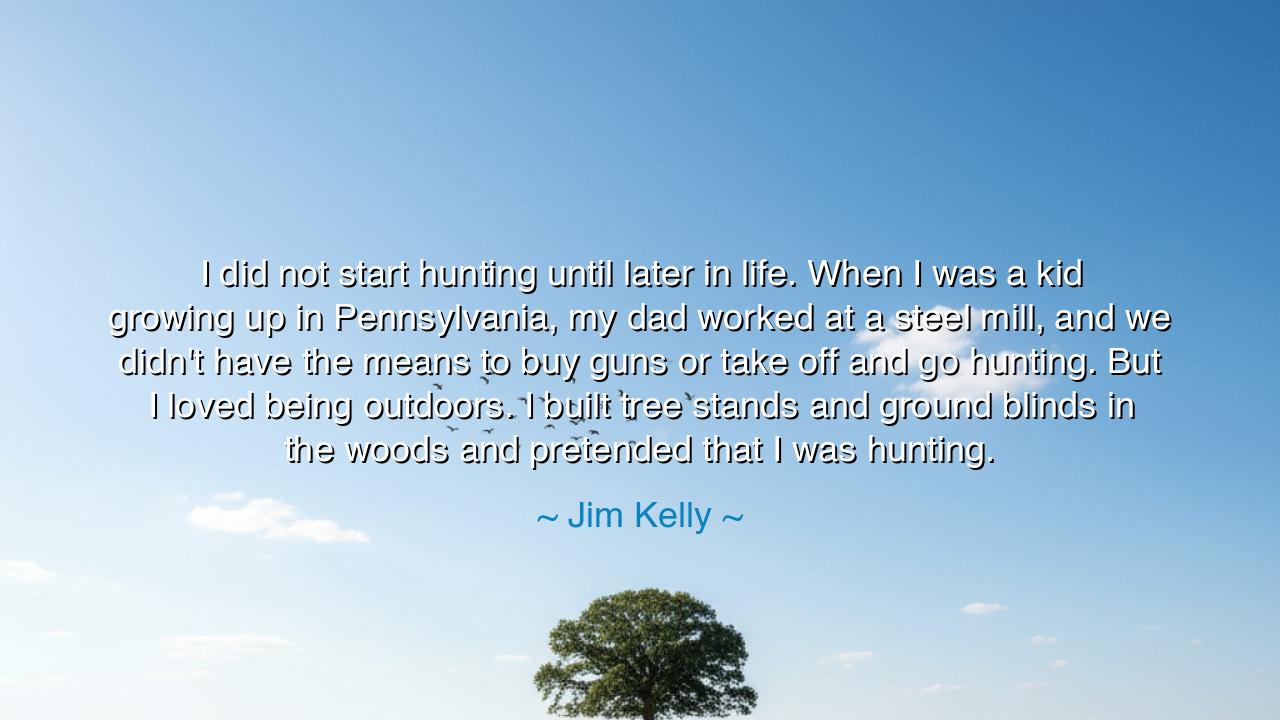
I did not start hunting until later in life. When I was a kid
I did not start hunting until later in life. When I was a kid growing up in Pennsylvania, my dad worked at a steel mill, and we didn't have the means to buy guns or take off and go hunting. But I loved being outdoors. I built tree stands and ground blinds in the woods and pretended that I was hunting.






In this humble and deeply human reflection, Jim Kelly, the legendary quarterback and man of endurance, speaks not of victory on the field, but of patience, imagination, and the quiet strength of humble beginnings. “I did not start hunting until later in life. When I was a kid growing up in Pennsylvania, my dad worked at a steel mill, and we didn’t have the means to buy guns or take off and go hunting. But I loved being outdoors. I built tree stands and ground blinds in the woods and pretended that I was hunting.” These are the words of a man who learned early that dreams are not born from abundance, but from desire—that the hunger of the soul, when nurtured by perseverance, becomes the foundation of greatness.
The meaning of this quote reaches far beyond hunting; it is about the power of imagination and endurance amid limitation. Kelly’s story is not of a boy who had everything, but of one who learned to create his own world when the world could not give him what he wanted. His father, a steelworker—symbol of the American working class—taught him not through lectures, but through example: that life demands toil, sacrifice, and resourcefulness. The boy who could not afford rifles or safaris instead built tree stands with his hands and hunted dreams with his heart. Such is the way of all who achieve greatness: they begin by pretending, envisioning, rehearsing the life they hope to live, until one day, their imagination becomes reality.
The origin of this wisdom lies in the rough yet fertile soil of hardship. In the steel towns of Pennsylvania, families knew the value of labor and the limits of luxury. Kelly’s childhood was shaped by scarcity, but also by freedom, nature, and inner drive. He learned that one need not possess tools to begin the work, nor wealth to begin the journey. What matters is the spirit that refuses to yield, that turns obstacles into opportunities. In pretending to hunt, Kelly was not escaping reality—he was preparing for it. The child who built blinds in the woods was also building discipline, patience, and focus, the same virtues that would later carry him to triumphs on the football field and beyond.
History, too, offers many echoes of this truth. Consider Abraham Lincoln, born in a log cabin, who had almost no access to books or schooling. Yet by the firelight, he read borrowed pages, recited speeches to the trees, and dreamed of law and leadership. Like Kelly, he hunted for meaning and mastery long before he possessed the means. Or think of Leonardo da Vinci, who as a boy from an illegitimate birth had no formal education, yet studied nature with fierce curiosity—sketching the flight of birds, dissecting flowers, and imagining machines that would not be built for centuries. These, too, were “hunters” without tools—souls who saw beyond their poverty into the boundless wealth of possibility.
There is also a spiritual undercurrent in Kelly’s words—the reminder that longing itself is a sacred teacher. When we are denied what we desire, we are invited to cultivate imagination, patience, and gratitude. The boy who must wait to hunt learns to love the forest more deeply than the one who inherits the rifle. He learns that joy does not depend on possession, but on presence. Kelly’s love for the outdoors was not diminished by lack; it was purified by it. When, in later life, he finally held a rifle and walked the woods as a hunter, the experience was richer for the years of waiting, dreaming, and pretending. To earn what one once imagined is to live twice: first in the dream, and then in the fulfillment.
The lesson here is timeless: do not despise small beginnings. The lack of resources is never the lack of potential. What you build with your hands, when your hands are empty, will strengthen your soul far more than what is given freely. If you cannot yet live your dream, practice it in spirit. Write your music before you own an instrument; speak your vision before others believe in it. Like the young Jim Kelly, learn to build your tree stand with scraps, to play the game in your mind before you ever touch the field. In doing so, you train both your imagination and your endurance—the two greatest tools of any life well-lived.
Therefore, my child, remember this truth: the greatest journeys often begin with nothing but longing and a will to act. The world may deny you its riches, but it cannot deny you your imagination, your effort, or your faith. Let your heart hunt even when your hands are empty. For one day, when you finally walk into the fullness of your dream, you will see that every moment of pretending was not falsehood, but prophecy—the whisper of destiny calling you toward the life you were born to create.






AAdministratorAdministrator
Welcome, honored guests. Please leave a comment, we will respond soon